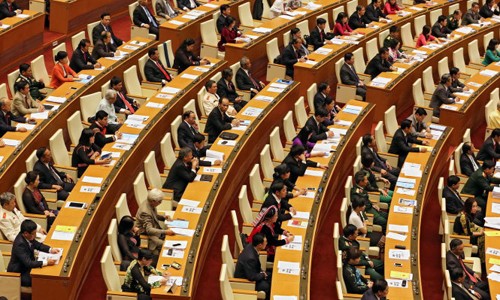(VOVworld) – The revised Civil Procedure Code is being discussed for the first time at the 9th session of the 13th NA. It’s a key law in the legal system as it is closely associated with people’s daily life.

In the meeting hall of the 9th session of the 13th National Assembly |
The National Assembly assigned the Supreme People’s Court to draft revisions to the Civil Procedure Code. The law institutionalizes the state policy on judicial reform including reorganizing a trial and clarifying the position, rights, and responsibilities of people involved in a legal procedure.
The revised Civil Procedure Code protects civil rights
NA deputies agreed on the need to revise the Civil Procedure Code to better acknowledge, respect, and ensure human rights and citizens’ rights. The Supreme People’s Court has given high priority and favorable conditions for citizens to protect the law and their legitimate rights. NA deputies are especially interested in a new regulation that the court must not refuse a case because there is no applicable law. Tran Tien Dung, a deputy for Ha Tinh province, said: “The supplemented regulation that the court must not refuse to resolve a case because there is no applicable law matches the development of civil society. The regulation has specified the 2013 Constitution’s regulations on protecting judicial, human, and civil rights, and the legitimate rights and interests of organizations and individuals.”
Minister of Justice Ha Hung Cuong, a deputy for Quang Binh province, said: "Opinions of ministries, sectors, and organizations from the central to the local level, and individuals have supported this regulation, which matches the Constitution. The court’s mission is to exercise judicial rights and protect justice in civil and trade relations.”
Vietnam is a state-governed by law of the people, by the people, and for the people. The State protects all legitimate rights of citizens and people’s legitimate aspirations must be addressed by functional agencies.
An advancement that matches international law
Another supplement to the Civil Procedure Code is legal precedent, which are standard verdicts that courts at all levels must study and apply. Legal precedents have legal values and mandatory standards. In the past the court based only on the Constitution and laws, not legal precedents, to rule on cases when there was no applicable law.
NA deputies agreed that the supplement of legal precedent is an advancement, matching international law. Truong Hoa Binh, Chief Judge of the Supreme People’s Court, a deputy for Long An province, and Head of the Drafting Board of the revised Civil Procedure Code, said: “Legal precedents must be carefully documented. We are reviewing previous trials to determine mandatory precedents for systematic application. The appraisal council of legal precedents selects legal precedents and submits them to the Supreme People’s Court for further assessment. If they are accepted, the Chief Judge of the Supreme People’s Court will sign to promulgate legal precedents.”
There have been several opinions on the revised Civil Procedure Code including requests to remove a certain content. Voters expect the Drafting Board to further adjust the draft revision and submit it to the NA for approval in the near future.